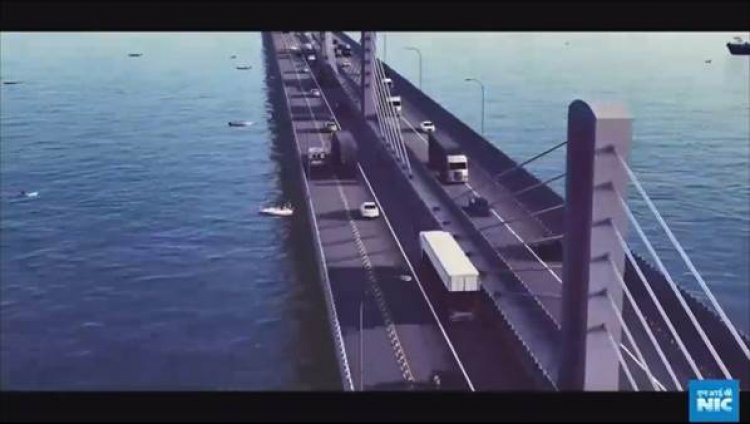Foundation stone laid for Dhubri-Phulbhari Bridge, India’s longest river bridge, connecting Assam and Meghalaya Demonstrating the cooperation between Japan and India, in development of the North East of India

Strengthening Connectivity and Promoting Quality Infrastructure towards Free and Open Indo-Pacific
New Delhi: The Government of Japan joins in felicitation of the Foundation Stone Laying Ceremony of the Dhubri-Phulbhari Bridge, a 19 km long bridge that will connect Assam and Meghalaya over the Brahmaputra River, making it the longest of all river bridges in India. The event was graced by the presence of Shri Narendra Modi, Honourable Prime Minister of India, Shri Sarbananda Sonowal, Honourable Chief Minister of Assam, and other Indian dignitaries.
The Dhubri-Phulbhari Bridge is provided with financial support by Japan, amounting to JPY 25,483 million (approximately INR 1,573 crore), as “North East Road Connectivity Improvement Project - Phase 3 (l)”. Once the bridge is completed, the traveling time between Dhubri and Phulbhari will become dramatically shorter. While the existing land route requires more than 8 hours, and even the ferry route requires about 2.5 hours, people will be able to make this trip with only 23 minutes of travel time. This Bridge will also provide a “flood-free route” as an alternative to the existing ferry route, which can become unstable and dangerous in the monsoon season, therefore providing resilience to the connectivity of the Region. This will be in line with the concept of “Coalition for Disaster Resilient Infrastructure.”
Speaking on this occasion, Mr. SUZUKI Satoshi, Ambassador of Japan to India, said, “It is my great honour to congratulate the Foundation Stone Laying Ceremony of the prestigious Dhubri-Phulbhari Bridge project, together with Honourable Prime Minister Modi. I am proud that Japan is able to make contributions to such an important project. The North East of India is situated where India’s “Act East Policy” and Japan’s vision of a “Free and Open Indo-Pacific” converge. Japan has been supporting development in the North East of India through the “Act East Forum”, which I and Mr. Shringla, Foreign Secretary co-chair, and has been a strong proponent of projects, including road connectivity improvement, water supply, and wastewater treatment, forest management, providing facilities for education and medicine, as well as technical assistance for sustainable mountainous road development. The Dhubri-Phulbhari Bridge will connect the North East with West Bengal and other parts of India, as well as with Bhutan and Bangladesh, and provide a route to the Bay of Bengal for the North East. Transforming the road connectivity landscape significantly and dramatically, this bridge will be a big “game-changer” for the North East to enhance the flow of goods and people. This demonstrates the spirit of a Free and Open Indo-Pacific. More importantly, the Dhubri-Phulbhari Bridge symbolizes the friendship between Japan and India and, in particular, the cooperative relationship that Japan and India will have in the North East of India in the future.
Speaking on this occasion, Mr. MATSUMOTO Katsuo, Chief Representative, JICA India said, “The construction of the Dhubri-Phulbari Bridge is expected to dramatically improve access from Bhutan to Bangladesh via India, facilitate the movement of people and the flow of goods, the flow of ideas. For example, traffic volume (number) is expected to be increased by 5,400 in 2030. Passenger volume as well as cargo volume are also expected to be increased by 2,954,000 (People/year) and 11,841,000 (ton/year) in 2030 respectively. Additionally, this project is expected to bring about many development impacts including dramatic reduction of travel times, improving market access and services, promoting the development of rural agricultural sector and provision of the large scale of employment opportunities through the project implementation.”
Since 2008, Japan, through its funding agency is known as JICA, has extended 231 billion Japanese Yen (approximately INR 16,174 crore*) as concessional ODA loans for the development of the North East Region. Enhancing connectivity is one of the prioritized areas to support. Japan has extended 146 billion Japanese Yen (approximately INR 10,239 crore*) over Phase 1 to Phase 4 of the North East Road Connectivity Improvement Project, to help develop and improve national highways in the North East States, including NH-40, NH-51, NH-54, and NH-208.
*The figures are calculated with the current exchange ratio: 1INR=1.428210JPY















































